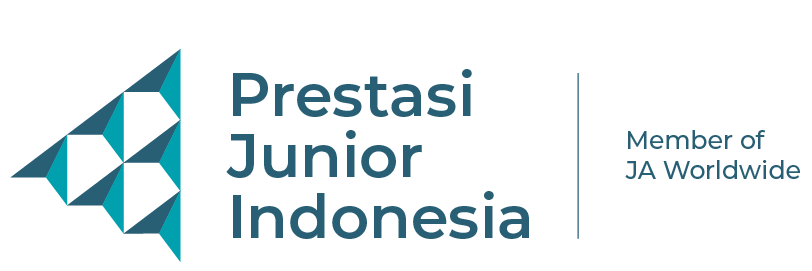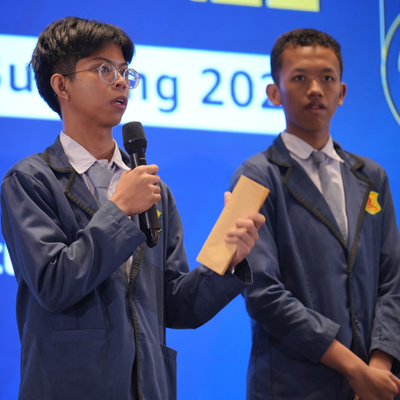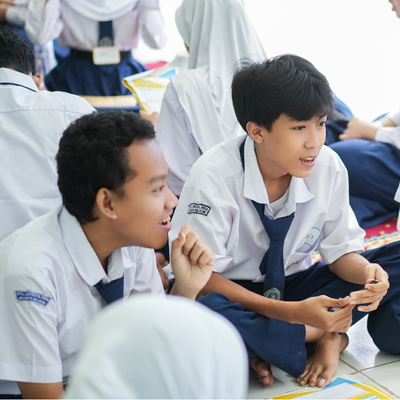Aug 25, 2025 – Young people in Bandung are proving their role as a driving force in the city’s economy. Through the NURTURE (Nurturing Urban Resilience through Unifying Resources and Education) program—part of the global Urban Futures initiative—70 food-sector entrepreneurs aged 18–33 achieved a collective revenue of IDR 6.71 billion (USD 410,000) between December 2024 and July 2025. The results were celebrated during #FYPday (Food Youth Preneur Day) on August 25, 2025, at Pendopo Wali Kota Bandung.
Building Resilient Urban Food Systems
Initiated by Yayasan Humanis dan Inovasi Sosial (Humanis) and Prestasi Junior Indonesia (PJI), with support from the Bandung City Government, the NURTURE program was designed to strengthen food security by building an inclusive, adaptive, and climate-resilient food entrepreneurship ecosystem.
While young entrepreneurs bring creativity and passion, they often face challenges such as weak financial recording, limited business planning, and underutilized digital platforms. NURTURE addressed these gaps through business training, intensive mentorship, digital technology integration, and business consultation—helping participants develop sustainable models and strengthen their competitiveness.
By supporting ventures in urban farming, local food processing, and sustainable food distribution, NURTURE not only grew businesses but also contributed to diversifying food sources, improving access to healthy and affordable options, and reducing reliance on external supply chains.
Voices from the Participants
Hariyanto, owner of Paskaw Hidroponik, shared how the program transformed his business:
“Before joining, I didn’t manage my business finances properly, and my marketing was weak. Through NURTURE, I learned structured financial recording, built networks with hydroponic farming communities, and started selling on social media and marketplaces. As a result, my monthly revenue nearly doubled, from IDR 6 million to IDR 11.8 million,” he said.
#FYPday: Celebrating Youth Innovation
#FYPday brought together 324 participants from diverse backgrounds, including entrepreneurs, government officials, private sector representatives, and community members.
The event featured:
– Keynote speeches, including remarks from the Mayor of Bandung, Muhammad Farhan, who emphasized the critical role of youth and collaboration in shaping sustainable food systems.
– Awards for NURTURE participants, recognizing excellence in categories such as Innovative Local Food Products and Business Sustainability Practices.
– Panel discussions and expert talks, where practitioners shared insights on scaling businesses and strengthening partnerships.
– Showcases of Urban Futures consortium initiatives, including Community Supported Agriculture and the Simpang.id platform, which connects stakeholders across Bandung’s food ecosystem.
The day concluded with a recognition ceremony for the top-performing NURTURE teams, underscoring the impact of youth-led solutions in driving food system resilience.
Multi-Stakeholder Collaboration for Lasting Impact
“Urban food resilience requires the involvement of all stakeholders, including youth,” said Pribadi Setiyanto, Chairman of Prestasi Junior Indonesia. “Through programs like NURTURE and events like #FYPday, we aim to connect the entrepreneurial spirit of young people with support from government, private sector, and communities—ultimately creating a stronger and more sustainable urban food ecosystem.”
Echoing this, Tunggal Pawestri, Executive Director of Humanis, highlighted Bandung’s unique role: “Bandung is a city of creativity, with dynamic youth who are ready to transform challenges in food security into opportunities. From digital innovation to sustainable food distribution, young entrepreneurs here are shaping healthier and more environmentally friendly solutions for urban communities.”
Scaling the Model
The success of NURTURE in Bandung demonstrates how cross-sector collaboration can empower youth as catalysts for innovation, economic growth, and sustainable urban food systems. With its strong results, this model offers valuable lessons that can be replicated in other Indonesian cities and beyond—building pathways toward food security and economic opportunities for the next generation.











